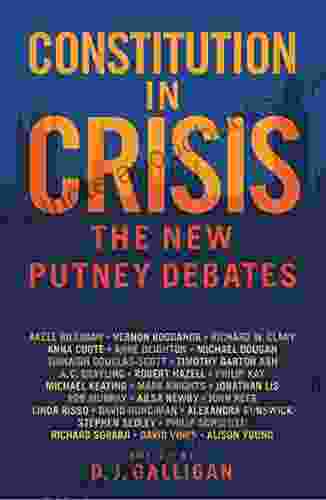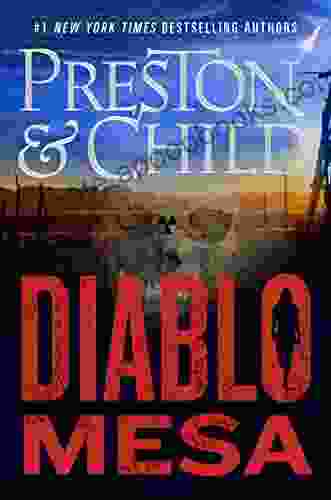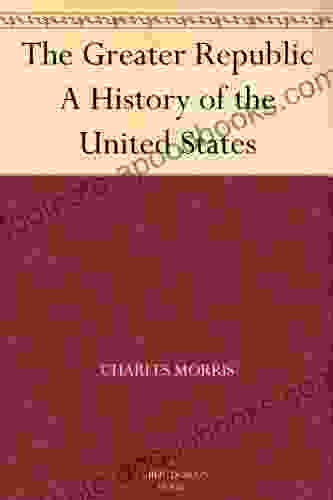The Constitution in Crisis: The New Putney Debates

5 out of 5
| Language | : | English |
| File size | : | 928 KB |
| Text-to-Speech | : | Enabled |
| Screen Reader | : | Supported |
| Enhanced typesetting | : | Enabled |
| Print length | : | 128 pages |
| X-Ray for textbooks | : | Enabled |
By Erwin Chemerinsky
The Constitution of the United States is the oldest written constitution in the world. It has been in effect for over two centuries, and it has been amended only 27 times. The Constitution has served as a model for other constitutions around the world, and it is considered to be one of the most important documents in American history.
However, the Constitution is not a static document. It has been interpreted and reinterpreted over the years, and its meaning has changed as the nation has changed. In recent years, the Constitution has been under increasing strain. The rise of partisan politics, the growth of social media, and the increasing polarization of American society have all put the Constitution to the test.
In The Constitution in Crisis: The New Putney Debates, Erwin Chemerinsky argues that the Constitution is facing a crisis. He contends that the Constitution is being undermined by a variety of forces, including:
- The rise of partisan politics
- The growth of social media
- The increasing polarization of American society
- The erosion of public trust in government
- The rise of populism
- The decline of civility
Chemerinsky argues that these forces are putting the Constitution at risk. He contends that the Constitution is only as strong as the people who believe in it, and that if the people lose faith in the Constitution, it will be difficult to defend it against those who seek to undermine it.
Chemerinsky's book is a timely and important warning about the state of the Constitution. He provides a clear and concise overview of the challenges facing the Constitution, and he offers a number of proposals for how to defend it.
The Rise of Partisan Politics
One of the biggest challenges facing the Constitution is the rise of partisan politics. In recent years, the two major political parties in the United States have become increasingly polarized. This polarization has made it difficult to find common ground on even the most basic issues.
The rise of partisan politics has also led to a decline in civility. Political discourse has become increasingly coarse and personal, and it is now common for politicians to demonize their opponents.
The rise of partisan politics and the decline of civility are both putting the Constitution at risk. The Constitution is a document that was designed to promote compromise and cooperation. However, when the two major political parties are polarized and uncivil, it is difficult to find common ground and compromise.
The Growth of Social Media
Another challenge facing the Constitution is the growth of social media. Social media has become a powerful force in American society. It is now the primary way that many people get their news and information.
Social media can be a positive force. It can be used to connect people, share information, and promote civic engagement. However, social media can also be a negative force. It can be used to spread misinformation and propaganda, and it can be used to create echo chambers where people only hear from those who agree with them.
The growth of social media is putting the Constitution at risk because it is making it more difficult to have informed debates about important issues. When people are only exposed to information that confirms their existing beliefs, it is difficult for them to change their minds or to see the other side of an issue.
The Increasing Polarization of American Society
The increasing polarization of American society is another challenge facing the Constitution. In recent years, Americans have become increasingly divided along political, racial, and economic lines.
The increasing polarization of American society is putting the Constitution at risk because it is making it more difficult to find common ground and compromise. When different groups of people are divided, it is difficult to build consensus on important issues.
The Erosion of Public Trust in Government
The erosion of public trust in government is another challenge facing the Constitution. In recent years, trust in government has declined significantly. This decline in trust is due to a number of factors, including:
- The rise of partisan politics
- The growth of social media
- The increasing polarization of American society
- The decline of civility
- The rise of populism
The erosion of public trust in government is putting the Constitution at risk because it is making it more difficult to defend the Constitution against those who seek to undermine it. When people do not trust the government, they are less likely to support the Constitution.
The Rise of Populism
The rise of populism is another challenge facing the Constitution. Populism is a political ideology that emphasizes the importance of the common people. Populists believe that the common people are being ignored by the elite, and they promise to give the common people a voice.
The rise of populism is putting the Constitution at risk because populists are often willing to undermine the Constitution in Free Download to achieve their goals. For example, some populists have argued that the Constitution is a document that was designed to protect the interests of the wealthy and powerful. They argue that the Constitution needs to be rewritten in Free Download to give more power to the common people.
The Decline of Civility
The decline of civility is another challenge facing the Constitution. Civility is the quality of being polite and respectful. In recent years, there has been a decline in civility in American society.
The decline of civility is putting the Constitution at risk because it is making it more difficult to have informed debates about important issues. When people are not civil, they are more likely to resort to personal attacks and name-calling.
What Can Be Done?
The challenges facing the Constitution are significant. However, Chemerinsky argues that the Constitution can be defended. He offers a number of proposals for how to defend the Constitution, including:
- Promote civic education. One of the best ways to defend the Constitution is to promote civic education. People need to learn about the Constitution and its history. They need to understand the importance of the Constitution and why it is important to defend it.
- Encourage civil discourse. Another way to defend the Constitution is to encourage civil discourse. People need to be able to have respectful and informed debates about important issues. They need to be able to listen to opposing viewpoints and to be willing to change their minds.
- Support the rule of law. The rule of law is essential for a free and democratic society. People need to believe that the law is fair and that it is applied equally to everyone. They need to be able to trust the government to uphold the rule of law.
- Defend the independence of the judiciary. The judiciary is an important part of the American government. The judiciary is responsible for interpreting the Constitution and for ensuring that the government is following the law.
- Encourage the media to be independent and fair. The media is an important part of a free and democratic society. The media is responsible for informing the public about important issues. The media needs to be independent and fair in Free Download to do its job effectively.
The challenges facing the Constitution are significant. However, Chemerinsky argues that the Constitution can be defended. By promoting civic education, encouraging civil discourse, supporting the rule of law, defending the independence of the judiciary, and encouraging the media to be independent and fair, we can help to ensure that the Constitution continues to be the foundation of our democracy for many years to come.
5 out of 5
| Language | : | English |
| File size | : | 928 KB |
| Text-to-Speech | : | Enabled |
| Screen Reader | : | Supported |
| Enhanced typesetting | : | Enabled |
| Print length | : | 128 pages |
| X-Ray for textbooks | : | Enabled |
Do you want to contribute by writing guest posts on this blog?
Please contact us and send us a resume of previous articles that you have written.
 Book
Book Novel
Novel Page
Page Chapter
Chapter Text
Text Story
Story Genre
Genre Reader
Reader Library
Library Paperback
Paperback E-book
E-book Magazine
Magazine Newspaper
Newspaper Paragraph
Paragraph Sentence
Sentence Bookmark
Bookmark Shelf
Shelf Glossary
Glossary Bibliography
Bibliography Foreword
Foreword Preface
Preface Synopsis
Synopsis Annotation
Annotation Footnote
Footnote Manuscript
Manuscript Scroll
Scroll Codex
Codex Tome
Tome Bestseller
Bestseller Classics
Classics Library card
Library card Narrative
Narrative Biography
Biography Autobiography
Autobiography Memoir
Memoir Reference
Reference Encyclopedia
Encyclopedia Catherine Fisher
Catherine Fisher Dmitry Orlov
Dmitry Orlov Edward L Gibson
Edward L Gibson Teresa Grabs
Teresa Grabs Shaka Bry
Shaka Bry Roy Huff
Roy Huff Kat Ward
Kat Ward Cindy Kirk
Cindy Kirk Charles Babbage
Charles Babbage Richard A Lougy
Richard A Lougy Karen E Mcconnell
Karen E Mcconnell Nelson R Orringer
Nelson R Orringer Charles K Wolfe
Charles K Wolfe Julia Kiernan
Julia Kiernan Danielle Bruckert
Danielle Bruckert Todd Fahnestock
Todd Fahnestock George W Grant
George W Grant Charles Henry
Charles Henry Carrie Callaghan
Carrie Callaghan Tananarive Due
Tananarive Due
Light bulbAdvertise smarter! Our strategic ad space ensures maximum exposure. Reserve your spot today!
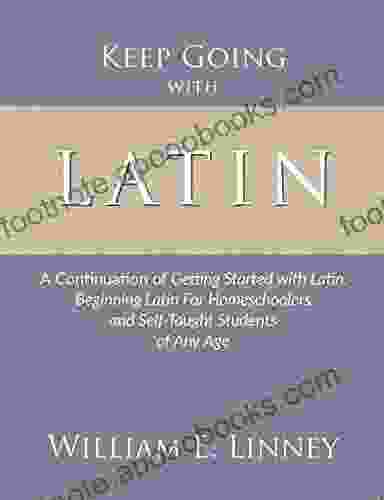
 Isaias BlairContinue Your Latin Journey with "Continuation of Getting Started with Latin"
Isaias BlairContinue Your Latin Journey with "Continuation of Getting Started with Latin" Bernard PowellFollow ·16.8k
Bernard PowellFollow ·16.8k Raymond ChandlerFollow ·10.9k
Raymond ChandlerFollow ·10.9k Kyle PowellFollow ·8.7k
Kyle PowellFollow ·8.7k Evan HayesFollow ·10.6k
Evan HayesFollow ·10.6k Jamal BlairFollow ·2k
Jamal BlairFollow ·2k Robin PowellFollow ·6.5k
Robin PowellFollow ·6.5k Jessie CoxFollow ·14.7k
Jessie CoxFollow ·14.7k Lord ByronFollow ·16.3k
Lord ByronFollow ·16.3k

 Angelo Ward
Angelo WardThe Original Home School: A Journey of Love, Learning,...
In the annals of...
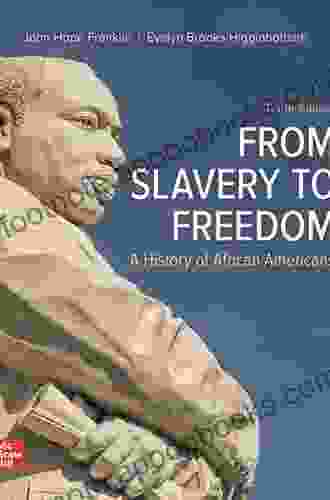
 Heath Powell
Heath PowellAfrican American Education in Slavery and Freedom: The...
The history of African...
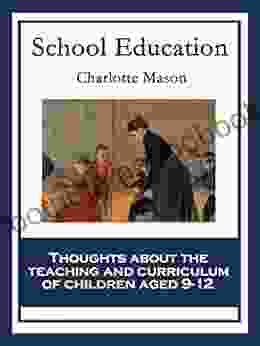
 Jamal Blair
Jamal BlairEmbrace the Wonder and Simplicity of Charlotte Mason...
Discover the...

 Cason Cox
Cason CoxUnveiling the Truth: A Mother's Courageous Journey to...
A Mother's Love Unbound: The Power of...

 Jamal Blair
Jamal BlairOver 100 Original Aussie Bush Ballads: A Journey Through...
Embark on a literary odyssey into the...
5 out of 5
| Language | : | English |
| File size | : | 928 KB |
| Text-to-Speech | : | Enabled |
| Screen Reader | : | Supported |
| Enhanced typesetting | : | Enabled |
| Print length | : | 128 pages |
| X-Ray for textbooks | : | Enabled |


